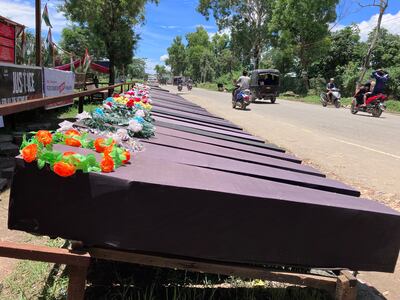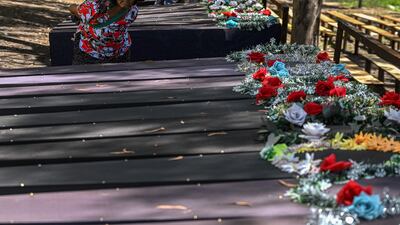Fresh violence erupted in India’s Churachandpur district in north-eastern Manipur state after Meitei women clashed with security forces over the mass burial of Kukis on Thursday.
An estimated 140 people have been killed in the continuing violent clashes between the warring majority-Hindu Meitei community and Christian Kukis which has left over 60,000 homeless. The communities clashed over a proposed government policy that would give special status to Meiteis.
Members of the Christian Kuki tribal group in India’s Manipur state had planned to organise a mass burial of victims of the ethnic violence but postponed it for a week following a request from the federal Home Ministry after the Meitei community raised objections.
Meira Paibis, a women's activist group from the Meitei community, clashed with security forces as they attempted to cross barricades and move towards Churachandpur – a Kuki-dominated area and also the epicentre of ethnic clashes that broke out on May 3.
News channels broadcast images of police firing tear gas to disperse the angry crowd.
“Since last evening, people started gathering at the border of the districts. There was a confrontation between security forces and Meira Paibis in the morning, many were injured but there were no such clashes in Churachandpur,” Gracie Haokip, a Kuki activist told The National.
The state has remained on edge for the last three months despite tens of thousands of security forces deployed in the region in a bid to maintain order. Gunfights and clashes between the divided communities have continued.

The Indigenous Tribal Leaders’ Forum, a Kuki organisation, had planned to organise a mass burial of 35 Kuki members at a state-owned patch of land in the Torbung area.
But it was opposed by the government and Meiteis over fears that it could spark fresh violence as the proposed area is situated on the border with Bishnupur, a Mietei-dominant area.
“The Ministry of Home Affairs requested us to wait for seven days over security reasons and then we can do the burial,” Ginza Vualzong, the representative of the ITLF, told The National.
More than 80 deceased belong to the Kuki community, the group said.
The bodies, including three women, were preserved with the help of white pumpkins – a traditional practice – and ice slabs at the Churachandpur District Hospital.
But over a dozen bodies were at hospitals in the state capital Imphal, a Meitei-dominated region, while several are still missing.
The leader of the Coordinating Committee on Manipur Integrity, an influential body of the Meitei community, asked the Kuki leaders to not play politics.
Police deployed additional security forces at the burial site and adjoining areas to prevent violence.
The Manipur High Court also intervened early on Thursday and asked authorities to maintain security deployments due to the possibility of large groups from both communities gathering at the spot and potentially “aggravating the already volatile situation”.
The Coordinating Committee on Manipur Integrity has made five demands to the government. They include legalisation of the burial site at Torbung, and state police forces – whom they accuse of favouring Meteis – being pulled back from the hill districts, for the safety of the Kuki communities, and bringing the bodies of Kukis to Imphal hospitals.
They have also demanded to speed up the separation of the Kuki administration from Meities.
“After long deliberation with various stakeholders late in the night, we have come to a conclusion that we will consider the request of MHA provided it gives us a written assurance on five demands,” ITLF said in a statement.


